Everyone has heard of Mardi Gras- the exciting street festival with iconic purple, green and gold colours, feathers, beads and parades.
It’s high energy and well known styling makes it a very popular theme in the event industry yet many clients don’t know much about the festival.
It often gets mixed up or combined with other nation’s festivals such as Rio Carnaval, Venice Carnivale and Dia de los Muertos.
in this article we’ll take a look into the history and traditions of Mardi Gras. We’ll highlight the key features to create the perfect Mardi Gras Inspired event.
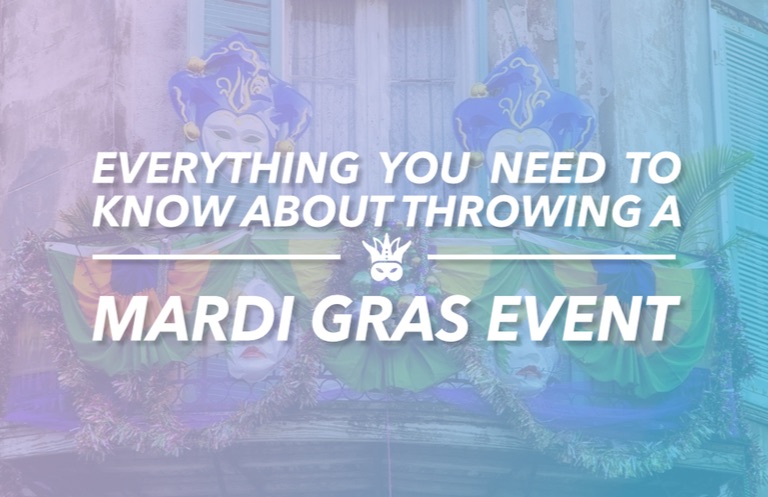
A brief history of Mardi Gras shows that it has been celebrated in the state of Louisiana since 1703, starting in a tiny settlement called Fort Louis de la mobile.
Mardi Gras originated in medieval Europe and travelled to America when French-Canadian explorer Jean Baptiste Le Moyne Sieur de Bienville arrived south of New Orleans in 1699. Although Mardi Gras is most famously associated with New Orleans it wasn’t celebrated there openly until the 1730’s. The Mardi Gras Carnival we know today’s earliest reference is 1781.
Mardi Gras translates from French to “Fat Tuesday”. the holiday signifies the last day in which the people of the western Christianity religion can eat rich food before the fasting of lent begins. Mardi Gras falls officially on Shrove Tuesday prior to lent beginning on Ash Wednesday. Its religious beginnings seem almost forgotten in its jubilant and ever growing festival style celebration though.
Nowadays Mardi Gras is such a huge event that it is celebrated from 6th January all the way through to shrove Tuesday (which can fall as late as 9th march depending upon the year). The official Mardi Gras website gives all the parade dates for each upcoming year.
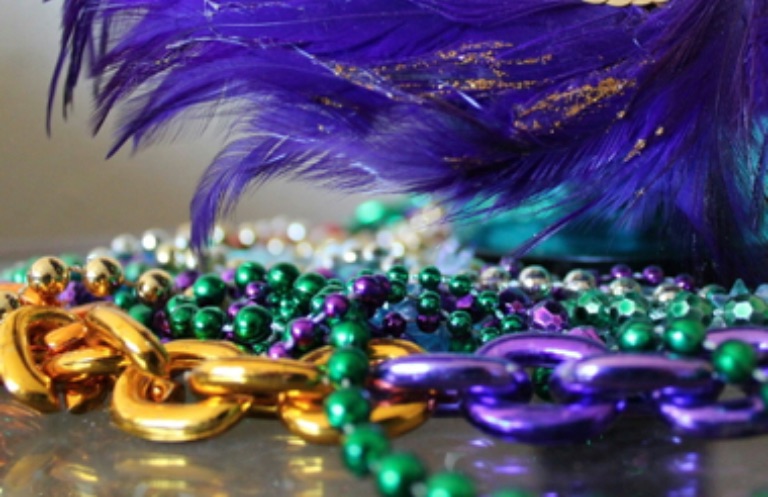
Throws
‘Throws’ is the term coined for the items thrown into the crowds at the Mardi Gras from the parade floats. Catching a throw in New Orleans is a pretty big deal and has a long history behind it.
Early throws included strings of glass beads or medallions depicting the Krewe’s crest or emblem- these are now a serious collector’s item.
Nowadays yelling “throw me something mister!” means you could catch a huge assortment of items including beads, medallions, doubloons, soft toys and even coconuts!
The most commonly associated throws are strings of beads.
Originally glass beads were thrown into crowds but as china’s cheap plastic manufacturing industry boomed plastic beads became the biggest trend in throws. At one point £20 million pounds worth of beads were shipped from china to Louisiana annually for Mardi Gras, and New Orleans was overwhelmed with plastic waste.
After decades of using these cheap plastic beads the environmental impact of this has caused the Krewes to re-consider the quality of their throws resulting in a whole new batch of exciting keepsakes.
Glass, metal and semi precious stone beads are becoming increasingly popular along with recycled beads meaning when you catch a beaded throw from a Mardi Gras parade it could have a history of being caught many times before.
Many of the Krewes now throw LED items into the crowds which is a fun and modern style of trinket. Some of the older Krewes throw handmade and signature throws including Zulu’s desirable coconuts, gold nuggets and Athena’s fedoras whilst newer krewe Femme fatales throw make up compacts!
How can I incorporate throws at my event?
It’s safe to say no Mardi Gras event is complete without plenty of fun throws for your guests to take home.
Theres a whole host of fun things you could leave out for your guests, why not go for a mixture of masquerade masks, beads and chocolate coins in the traditional colours!
Traditional colours: Green, Purple and Gold
The official colours of Mardi Gras are one of the reasons the celebration remains so iconic, its trio of rich colours are unmistakable.
These colours were selected in 1892 by Rex in their parade float ‘symbolism of colours’ – that year ‘The King of Carnival’ chose them and the meanings assigned to them.
Purple stands for justice, green for faith and gold for power. Purple is of course associated with royalty as is gold. The colour green was most likely selected from ‘coat of arm rules’ which only allows certain colours.
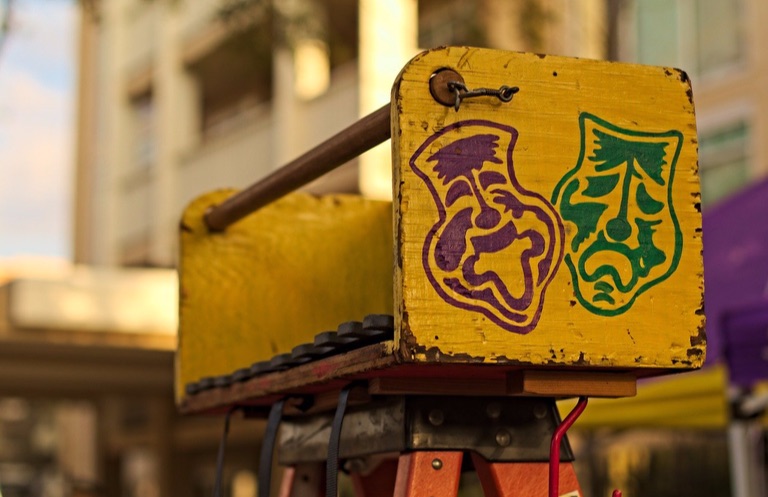
The story of why 3 colours were suggested for mardi gras is because the USA, UK and France all had three colours in their flags- and so the king of Mardi Gras should have three colours for his kingdom too.
Its even the colours sprinkled on the traditional Mardi Gras King Cake. If nothing else- its said that wearing green, purple and gold at Mardi Gras will guarantee you more throws.
How can I incorporate traditional colours at my event?
Even if your guests don’t want to adhere to the trio of colours of this amazing event your entertainers can represent the Mardi Gras flag! Stilt walkers in green, gold and purple will tower over your guests creating an eye-catching photo opportunity and a fun mix and mingle form of entertainment.
Decorating your venue can also really strengthen the theme, why not use these colours in a balloon arch, or for your table centrepieces and lighting. For a really big impact you could even organise a confetti cannon or balloon drop in green, purple and gold!
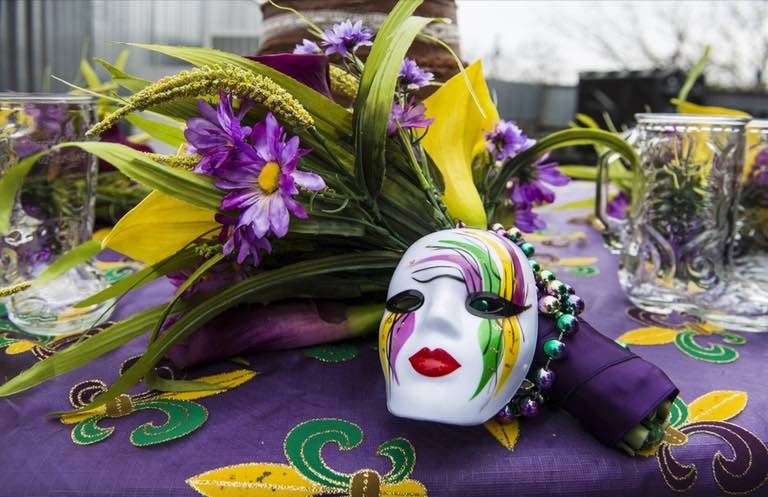
Masks
Interestingly wearing a mask is illegal in New Orleans… on every day expect the official day of Mardi Gras.
The tradition of mask wearing at Mardi Gras goes back before even parades were popular. It began with secret societies organising masquerade balls to celebrate. The masks are the same type as those worn at the Venice Carnivale in February which may explain why they sometimes get tied together!
The beauty of a mask allowed the wearer to hide their identity meaning that Mardi Gras is one of the true occasions where masks were used to create a sense of mystery and intrigue. Festival goers wear a variety of masks either covering the eyes or whole face, whilst parade performers are required to wear a mask!
How can I incorporate masks at my event?
Traditionally masks were in the official three colours and we can’t think of a better way to get your guests in the mood at your event.
You could have flamboyant, colourful mardi gras showgirls welcoming guests and handing out masquerade masks or place them at the table for your guests to wear after dinner. Its a nice keepsake too that will remind your guests about your event.
Flambeaux (Fire Performers)
No Mardi Gras event is complete without an exciting element of fire. Fire torches at Mardi Gras date back to the 1830s where flaming torches, or “flambeaux“, lit the way for the Krewe’s members. They also lent each event an exciting air of romance and festivity.
So flambeaux has turned from a traditional necessity of providing light before a world with street lighting to a fun, entertaining visual spectacle. Many Krewes today still have flambeaux ‘guiding’ their float and parade through the streets.
The flambeaux carrier’s performance has grown increasingly elaborate and some Krewes have even ventured into LED lighting displays. It’s really easy to add a burst of energy and a nod to the flambeaux performers of New Orleans with a fire performer.
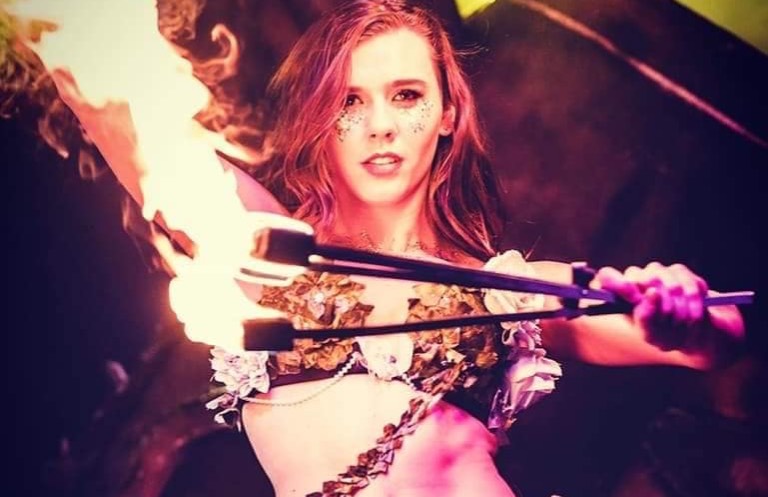
How can I incorporate fire performers at my event?
Check out our article “How to book a fire performer” to see what type of fire performer would best suit your venue and event.
There are many exciting options, your fire performers could warm your guests up on their arrival with a welcome performance outside the venue entrance. They could walk as part of a parade with ambient, flowing fire skills or perform a fire stage show. Or if you want to modernise your event- just like some of the Krewes do- you could book an LED performer to act as a futuristic flambeaux at your event.
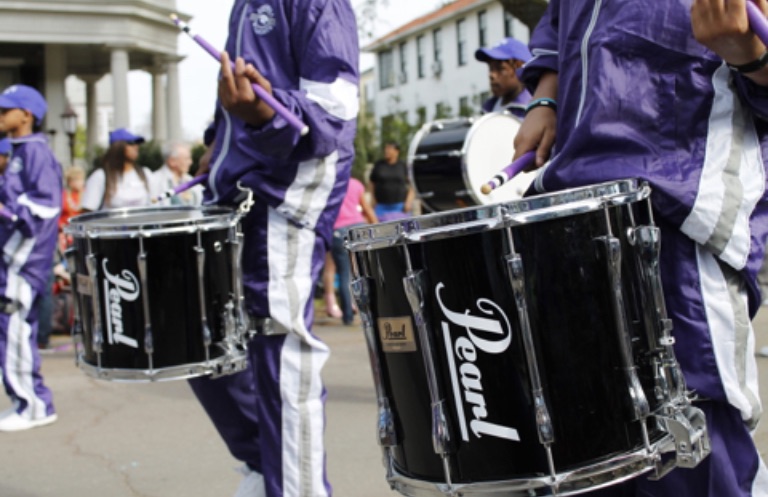
Parades
Saving the best ’til last… the Mardi Gras parades! the Mardi Gras event is centred around the procession of the floats and the parades around New Orleans.
Each Krewe has their own themed float and they proceed around the city throughout the carnival period with the largest parade being on Mardi Gras itself.
The parade schedule starts in early January and continues all the way through to Mardi Gras itself. The parades draw huge crowds to the streets and balconies creating an incredible atmosphere
Each year the Krewes continue to create extravagant, detailed and intricate floats. The theme varies year to year and is usually kept secret right up until parade day- they often reflect current issues or look back at traditions.
Parades feature walking perfomers, dancers, showgirls, drummers, musicians, stilt walkers, puppeteers, acrobats, LED performers and many more!
How can I incorporate a parade into my event?
Turn up the jazz music and let your performers begin a procession through your venue. We recommend as much variety as your budget allows to really create a high impact!
All your performers will be able to provide stage or ambient performance as well as their parade activity. Carnival drummers are bound to add some exciting energy to the event and guests can’t ignore the giant puppets as they stroll along with the crowd. Be sure to ask your booking co-ordinator about all the exciting parade possibilities and the option of a full Mardi Gras package to ensure your event exceeds your own expectation and remains stress free.
So there you have it, a brief history into the Mardi Gras event and its iconic features, there is no ‘official’ Mardi Gras as it belongs to everyone- it is after all a holiday celebrated allover the world in a different manner of ways.
The Venice Carnivale and Brazilian Rio Carnaval are also christian originating festivals to celebrate the same holiday but under a different styling and with different symbolism. They all share a common factor- celebration before lent, and the Krewes of New Orleans really set the bar high with their amazing festival organisation.
New Orleans may be a little far for most people but here at Oddle Entertainment we can bring all the colours and traditions of the world’s greatest carnival to your event instead- just enquire about our Mardi Gras Package today!